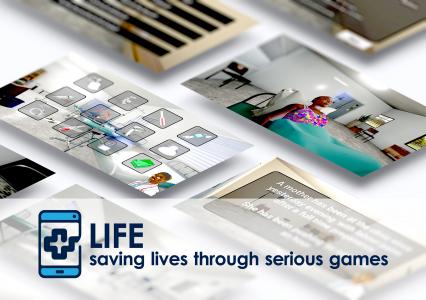This blog was originally published by the Lancet Global Health blog.
 Author:
Author:
Prof. Mike English leads the LIFE project team, based at the University of Oxford, UK.
Medical emergencies are major causes of death globally, but any one health-care worker, especially in primary care or community settings, will rarely provide an emergency response. At present, frequent face-to-face training for health-care workers is prohibitively expensive and difficult to access, meaning that many in remote settings are not using up to date practices. An online simulation called Life-saving Instruction For Emergencies (LIFE) may provide some of the solutions to combat these issues.
About LIFE
In Africa, 470,000 babies die each year on the day they are born, and this figure increases to 1 million deaths within the first 28 days, the neonatal period. The World Health Organization (WHO) estimates that over two-thirds of these newborn deaths could be avoided through existing maternal and child healthcare programmes, if they were taught and implemented effectively. We think we can help – LIFE is a serious game that will train health-care workers in Africa to act correctly in emergency scenarios and save lives.
We developed the ETAT+ course in 2006 specifically for implementing in facility-based care in east Africa, to ensure sick newborns and children from even the poorest families receive high quality, effective care wherever they seek medical attention. ETAT+ is a comprehensive and proven intervention that has trained over 5000 health-care workers and 3000 students in Kenya, Uganda, Rwanda, Tanzania, Zambia, Zimbabwe, Malawi, and most recently Myanmar. It has benefited hundreds of thousands of children in the 10 years since the programme was started.
However, this isn’t enough.
ETAT+ gained the important support of the UK’s Royal College of Paediatrics and Child Health and several east African paediatric associations and universities, yet only a small fraction of health-care workers have been trained.
Our Oxford-Kenyan team is now building ETAT+ into a digital platform based on the concept of serious gaming. LIFE will deliver interactive, instructional emergency care training using a 3D virtual hospital via mobile phones. We are also excited to announce a partnership with the technology brand HTC, who will help us to develop a low-cost virtual reality scenario using their new HTC Vive headsets. This will enhance user immersion with the possibility of making high quality simulation training available at low cost within facilities and training centres.
We are raising £100,000 through crowdfunding to develop our first scenario, focusing on neonatal resuscitation for low-resource settings, and conduct extensive user testing in Oxford and Kenya.
We will develop and test the LIFE platform in trials in Oxford and Kenya. Health-care workers will benefit from an app that can be updated efficiently and can capture data on trainees. Development will include approaches to incentivising participation and learning, and exploration of sustainable funding models. If successful, the concept can be applied to multiple neonatal, child, maternal, and adult emergencies.
So how will it work?
The serious game will enable health-care workers to follow the highly structured care pathways required when providing emergency care. Key pieces of information are sought at each step that determine the correct actions to perform. Executing cue-response sequences perfectly, rapidly, and automatically demonstrates mastery and supports effective care. This can be achieved on a greater scale and lower cost than in face-to-face training. Systematic reviews show that technology-enhanced training, including games, can be associated with large effects on knowledge, skills, and behaviour. Maximal learning is associated with the option to play as many times as the trainee wishes.
Based on our existing successful training experience, and with early development grants, we have built a prototype mobile game to teach neonatal resuscitation appropriate to Africa on a smartphone. We received very positive responses from small focus groups in Oxford and Kenya.
Supporting the idea that the LIFE platform could play an important part in the future of training is the growth in the popularity of smartphones. Sales of smartphones capable of running 3D games topped 3.5 million (in a population of 40 million) in 2014 in Kenya, and are growing rapidly. Similar changes are occurring elsewhere in Africa, supporting the potential of 3D training approaches delivered through smartphones and low-cost VR headsets. Taking advantage of this technology can help us deliver essential knowledge at massive scale. This could help support universal coverage with correctly delivered essential interventions and contribute to achieving the sustainable development goals for neonatal, child and maternal mortality.
“The LIFE project is both innovative and transformative. It shows the way we should think about and take advantage of the changing technological landscape in Africa”
Dr Wilson Were
World Health Organisation’s Department of Maternal, Newborn, Child and Adolescent Health
Ultimately, providing such training using these technologies would support the development of a data centre that can be used to i) improve games, ii) advise the playing community of updates to recommendations when new evidence becomes available (changing game content), iii) recommend regular retraining to maintain knowledge, iv) alert players to new courses to extend their range of skills, v) deliver and archive certification, vi) track trainees skills and locations, and vii) create a social network supporting better practice.
Our crowdfunding campaign is live through the University of Oxford’s OxReach crowdfunding platform. Please see our twitter pages for updates on our campaign.
To help launch the LIFE platform donations have been given by Medicines Sans Frontiere (UK) and HTC that recently launched its virtual reality platform HTC Vive.

 Author:
Author: